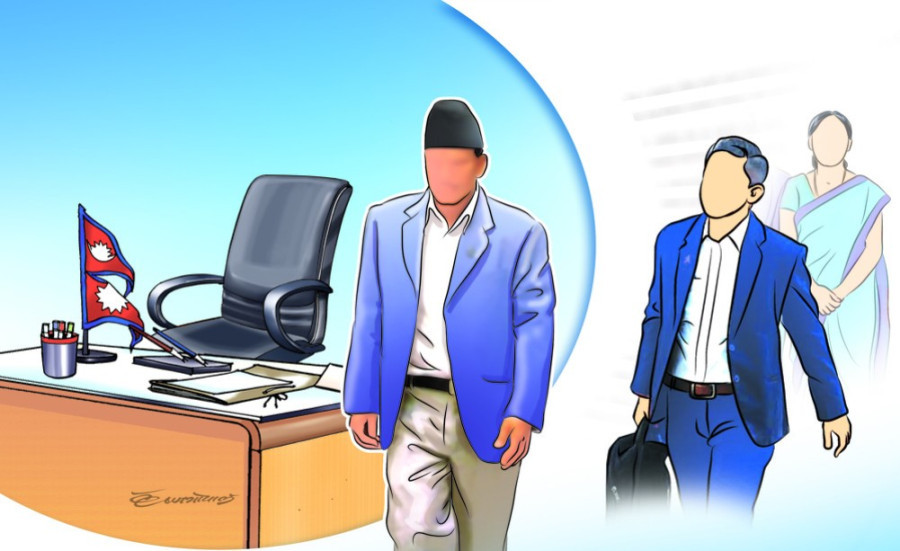Politics
Unexplained, sneaky changes in civil service bill spark concerns
Crucial cooling-off clause has been diluted to allow early appointments in constitutional and diplomatic positions.
Anil Giri
One of the highlights of the new Civil Service Bill was a provision barring top bureaucrats from taking up political appointments for two years after retirement. The widely-debated provision was seen as a step towards curbing the dominance of freshly-retired civil servants in constitutional appointments.
The provision was expected to prevent top bureaucrats from working in cahoots with the government of the day in instances of policy corruption, on a quid pro quo basis.
The provision hadn’t sat well with top bureaucrats. A team including Chief Secretary Ek Narayan Aryal and government secretaries lobbied hard for its removal as they visited almost all political power centres.
The parliamentary State Affairs and Good Governance Committee nevertheless finalised the new text of the Civil Service Bill on May 14 that incorporated the provision of a two-year ‘cooling-off’ period before top bureaucrats could be appointed to constitutional and ambassadorial positions.
Despite intense lobbying, a larger political understanding had emerged to retain the cooling-off clause.
Section 82(4) of the bill states that any employee who has resigned or retired must have completed at least two years before taking another government appointment.
However, alongside the committee’s decision, a new rider has been incorporated into the bill. The bill’s Section 82(5) now includes a provision that runs contrary to the earlier clause, allowing civil servants to take another government appointment within two years of their resignation or retirement.
The latest version of the bill states that the cooling-off period is not applicable in the case of “other appointments made by the government of Nepal in constitutional or diplomatic postings”.
The text of the bill finalised by the committee was tabled in the House of Representatives and endorsed by overwhelming support but no lawmaker noticed the last-minute changes.
But when the final text was made public on Monday, the cooling-off provision had been tweaked.
Chairperson of the State Affairs and Good Governance Committee Ramhari Khatiwada himself expressed surprise at the move. “We are trying to find out the architect of this cunning act,” said. “The National Assembly will now correct it.”
A bill becomes law only after both the House of Representatives and the National Assembly endorse it and the President approves it.
Under no circumstances will the cooling-off period provision be removed from the Civil Service Bill, Khatiwada added.
Speaking with journalists at Singha Durbar on Monday, he said that although the bill was passed by a majority vote in the lower house on Sunday, there had been some misunderstandings, which the committee members sat down and clarified.
Minister for Federal Affairs and General Administration Raj Kumar Gupta had tabled the bill for endorsement in the House meeting on Sunday. Gupta represents the CPN-UML, which had been indirectly opposing the provision.
“We suspect manipulation in the text by some senior officials at the Ministry of Federal Affairs and General Administration,” a Nepali Congress lawmaker said. “We also have serious doubts with the senior members of the Parliament Secretariat.”
This “tampering” is a result of a collusion between the ministry and parliament secretariat, the lawmaker added, and it will be changed in the National Assembly, which is yet to endorse the bill.
In the meeting on Monday, members of the State Affairs and Good Governance Committee discussed the possible manipulation in the text but they were also clueless about who was responsible for it. Yet there was a consensus that the added phrase needs to be removed in the National Assembly.
Hitraj Pandey, chief whip of the main opposition party, the Maoist Centre, stated that there is no confusion over the committee’s decision to set a two-year cooling-off period.
“The committee’s decision cannot be changed,” he said. “The provision, arrived at after much struggle, cannot be altered. The committee’s decision clearly states a two-year cooling-off period.”
Committee members are meeting Speaker Devraj Ghimire on Tuesday morning to draw his attention to the alteration.
The cooling-off period will not be removed under any circumstance, Khatiwada reiterated, explaining that the bill clearly states that if any civil servant or employee resigns or is removed from service, they cannot be appointed to any constitutional or government position until two years after the date of their retirement from service.




 10.12°C Kathmandu
10.12°C Kathmandu















